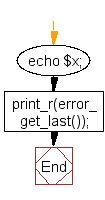PHP Exercises : Get the last occurred error
PHP : Exercise-20 with Solution
Write a PHP script to get the last occurred error.
Sample Solution: -
PHP Code:
<?php
echo $x;
print_r(error_get_last());
?>
Sample Output:
Array
(
[type] => 8
[message] => Undefined variable: x
[file] => /home/students/0d0149c0-f42e-11e6-a8c0-b738b9f
f32f9.php
[line] => 2
)
Flowchart:

Note: error_get_last() function returns an associative array describing the last error with keys "type", "message", "file" and "line". If the error has been caused by a PHP internal function then the "message" begins with its name. Returns NULL if there hasn't been an error yet.
PHP Code Editor:
Have another way to solve this solution? Contribute your code (and comments) through Disqus.
Previous: Arithmetic operations on character variables : $d = 'A00'. Using this variable print the following numbers.
Next: Write a PHP function to test whether a number is greater than 30, 20 or 10 using ternary operator.
What is the difficulty level of this exercise?
Test your Programming skills with w3resource's quiz.
PHP: Tips of the Day
How to Sort Multi-dimensional Array by Value?
Try a usort, If you are still on PHP 5.2 or earlier, you'll have to define a sorting function first:
Example:
function sortByOrder($a, $b) {
return $a['order'] - $b['order'];
}
usort($myArray, 'sortByOrder');
Starting in PHP 5.3, you can use an anonymous function:
usort($myArray, function($a, $b) {
return $a['order'] - $b['order'];
});
And finally with PHP 7 you can use the spaceship operator:
usort($myArray, function($a, $b) {
return $a['order'] <=> $b['order'];
});
To extend this to multi-dimensional sorting, reference the second/third sorting elements if the first is zero - best explained below. You can also use this for sorting on sub-elements.
usort($myArray, function($a, $b) {
$retval = $a['order'] <=> $b['order'];
if ($retval == 0) {
$retval = $a['suborder'] <=> $b['suborder'];
if ($retval == 0) {
$retval = $a['details']['subsuborder'] <=> $b['details']['subsuborder'];
}
}
return $retval;
});
If you need to retain key associations, use uasort() - see comparison of array sorting functions in the manual
Ref : https://bit.ly/3i77vCC
- New Content published on w3resource:
- HTML-CSS Practical: Exercises, Practice, Solution
- Java Regular Expression: Exercises, Practice, Solution
- Scala Programming Exercises, Practice, Solution
- Python Itertools exercises
- Python Numpy exercises
- Python GeoPy Package exercises
- Python Pandas exercises
- Python nltk exercises
- Python BeautifulSoup exercises
- Form Template
- Composer - PHP Package Manager
- PHPUnit - PHP Testing
- Laravel - PHP Framework
- Angular - JavaScript Framework
- Vue - JavaScript Framework
- Jest - JavaScript Testing Framework
